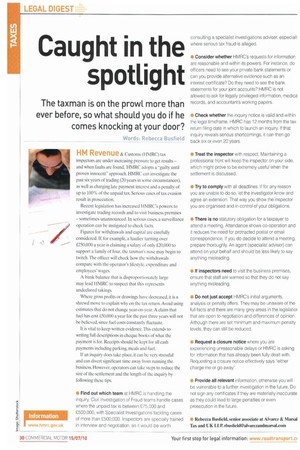Caught in the spotlight
Page 30

If you've noticed an error in this article please click here to report it so we can fix it.
The taxman is on the prowl more than ever before, so what should you do if he comes knocking at your door?
Words: Rebecca Busfietd HM Revenue& Customs (HMRC) tax inspectors are under increasing pressure to get results — and when faults are found, HMRC adopts a --guilty until proven innocent" approach. HMRC can investigate the past six years of trading (20 years in some circumstances), as well as charging late payment interest and a penalty of up to 100% of the unpaid tax. Serious cases of tax evasion result in prosecution.
Recent legislation has increased HMRC's powers to investigate trading records and to visit business premises — sometimes unannounced. In serious cases. a surveillance operation can be instigated to check facts.
Figures for withdrawals and capital are carefully considered. If, for example, a haulier turning over £250,000 a year is claiming a salary of only £20,000 to support a family of four, the taxman's nose may begin to twitch. The officer will check how the withdrawals compare with the operator's lifestyle, expenditure and employees' wages.
A bank balance that is disproportionately large may lead HMRC to suspect that this represents undeclared takings.
Where gross profits or drawings have decreased, it is a shrewd move to explain why on the tax return. Avoid using estimates that do not change year-on-year. A claim that fuel has cost l'.50.000 a year for the past three years will not he believed, since fuel costs constantly fluctuate.
It is vital to keep written evidence. This extends to writing full descriptions in cheque books of what the payment is for. Receipts should be kept for all cash payments including parking, meals and fuel.
If an inquiry does take place, it can be very stressful and can divert significant time away from running the business. However, operators can take steps to reduce the size of the settlement and the length of the inquiry by following these tips.
• Find out which team at HMRC is handling the inquiry. Civil Investigation of Fraud teams handle cases where the unpaid tax is between E75,000 and £500,000, with Specialist Investigations tackling cases of more than £500,000. Inspectors are specially trained in interview and negotiation, so it would be worth consulting a specialist investigations adviser, especiall. where serious tax fraud is alleged.
• Consider whether HMRC's requests for information are reasonable and within its powers. For instance, do officers need to see your private bank statements or can you provide alternative evidence such as an interest certificate? Do they need to see the bank statements for your joint accounts? HMRC is not allowed to ask for legally privileged information, medica records, and accountant's working papers.
• Check whether the inquiry notice is valid and within the legal timeframe. HMRC has 12 months from the tax return filing date in which to launch an inquiry. If that inquiry reveals serious shortcomings, it can then go back six or even 20 years.
• Treat the inspector wth respect. Maintaining a professional front will keep the inspector on your side, which might prove to be extremely useful when the settlement is discussed.
• Try to comply with all deadlines. If for any reason you are unable to do so, let the investigator know and agree an extension. That way you show the inspector you are organised and in control of your obligations.
• There is no statutory obligation for a taxpayer to attend a meeting. Attendance shows co-operation and it reduces the need for protracted postal or email correspondence. If you do decide to attend a meeting, prepare thoroughly. An agent (specialist adviser) can attend on your behalf and should be less likely to say anything misleading.
• If inspectors need to visit the business premises, ensure that staff are warned so that they do not say anything misleading.
• Do not just accept HMRUs initial arguments, analysis or penalty offers. They may be unaware of the full facts and there are many grey areas in the legislatior that are open to negotiation and differences of opinion. Although there are set minimum and maximum penalty levels, they can still be reduced.
• Request a closure notice where you are experiencing unreasonable delays or HMRC is asking for information that has already been fully dealt with. Requesting a closure notice effectively says "either charge me or go away".
• Provide all relevant information, otherwise you will be vulnerable to a further investigation in the future. Do not sign any certificates if they are materially inaccurate as they could lead to large penalties or even prosecution in the future.
• Rebecca Bustield, senior associate at Alvarez & Marsal Tax and UK LIP. rbuslield@alvarezandmarsalcom
































































































































